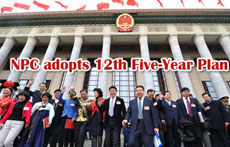Full text: Report on China's economic, social development plan
(Xinhua)
Updated: 2011-03-18 15:00
5. Reform and opening up were further intensified.
New breakthroughs were made in reforming major areas and key links.
In terms of rural reforms, we launched the reform of tenure in collective forests in an orderly manner and devolved the tenure of more than 80% of the country's collective forests to rural households, and made steady progress in the trial reform of state forestry farms and in restructuring state farms built on reclaimed land.
In terms of enterprise reforms, the reform to institute a corporate system or a stockholding system was carried out in over 70% of the central state-owned enterprises (SOEs) and enterprises subordinate to them, and the pilot project for standardizing boards of directors was extended to 32 central SOEs. We made further progress in reforming the power industry, postal services and public utilities. We also promulgated and implemented a number of supporting policies to promote the development of the non-public sector and small and medium-sized enterprises.
In terms of reforming the fiscal and taxation systems, we implemented the reform to place county finances directly under the management of provincial governments in 970 counties across 27 provinces; conducted trials in the western region on the reform of resource taxes on oil and natural gas; and extended the urban construction and maintenance tax and education surcharge to foreign enterprises and nationals.
In terms of reforming the financial system, steady progress was made in reforming the China Development Bank, policy-based financial institutions and asset management companies; the Agricultural Bank of China was listed successfully; stock index futures were launched; corporate bonds developed steadily; the reform of the RMB exchange rate regime continued; and the RMB was used more widely in cross-border trade.
In terms of reforming the prices of resource products, we made smooth progress in trials of publicizing the costs of supplying water in cities and of a comprehensive price reform of water for agricultural purpose; introduced a punitive electricity rate on products exceeding limits of energy consumption per unit of production; and set a unified rate for on-grid electricity generated from agricultural and forest biomass.
In terms of reforming social programs, we deepened the five key reforms in the pharmaceutical and healthcare systems; implemented the national system for basic drugs in 60% of primary-level medical and health care institutions run by the government; vigorously explored and constantly deepened the reform of public hospitals in 16 state-designated trial cities and 37 province-designated trial areas; and introduced the guidelines on further encouraging and guiding nongovernmental capital toward medical institutions. We comprehensively launched the national pilot program for restructuring the education system, and thoroughly implemented the performance-based pay reform for compulsory education schools. We pushed forward with the reform of the cultural management system in an orderly manner, and basically completed trials on turning provincial-level state-owned theatre troupes into corporations and the transformation of for-profit publishing houses into enterprises. Positive results were made in national pilot projects to carry out integrated, complete reforms.
The development level of the open economy was raised further. We adhered to the strategies of diversifying markets and competing on quality; tightened control over exports of resource products and products whose production is energy-intensive or highly polluting; increased imports of raw materials in short supply on the domestic market, energy-intensive products, advanced technology, and key spare parts and components; and eased the trade imbalance. Total import and export volume reached US$2.97276 trillion in 2010, an increase of 34.7%. Exports rose 31.3%, imports rose 38.7%, and the trade surplus was down 6.4% from the previous year. We introduced the guidelines on better utilizing foreign investment and guided foreign investments toward high-end manufacturing, high-tech industries, modern service industries, new energy sources, energy conservation and environmental protection industries, and the central and western regions. Utilized foreign direct investment in 2010 (excluding the banking, securities and insurance sectors) totaled $105.74 billion, up 17.4%. Disbursed foreign loans reached $20.5 billion, up 57%. We vigorously implemented the "go global" strategy and made further progress in a number of major outward investment projects. Non-financial outward direct investment for the year amounted to $59 billion, an increase of 36.3%. Receipts from overseas project contracting operations reached $92.2 billion, an increase of 18.7%.



